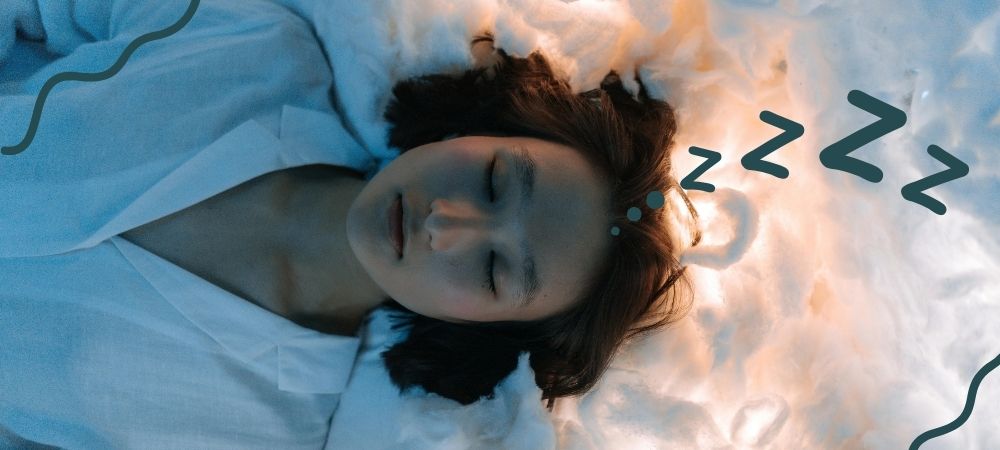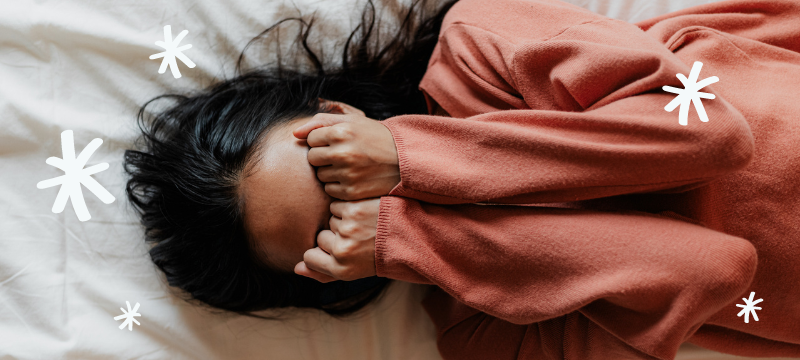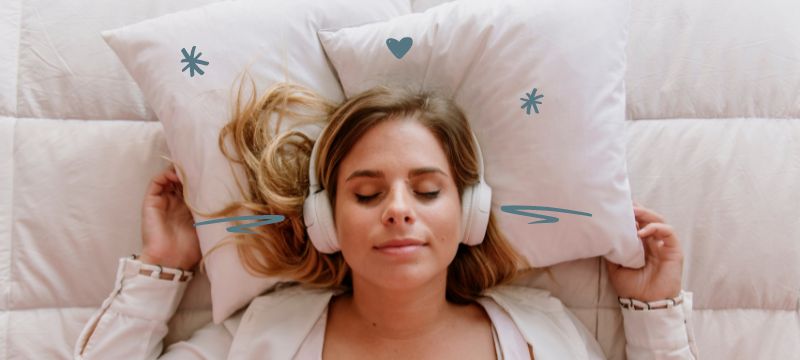How To Switch Off Your ADHD Brain For Better Sleep

Switching off a busy ADHD brain for restful sleep can feel impossible.

Why sleep is hard with ADHD
Do you ever lie awake in bed, feeling exhausted but wide awake?
Your mind races with a million thoughts, replaying the day’s events or planning for tomorrow.
If you have ADHD, this scenario is probably all too familiar. Studies show a strong link between ADHD and sleep difficulties.
The jury is out as to what causes ADHD and poor sleep.
Since impulse control can be a challenge, settling down for bed might be difficult. This may lead to bedtime resistance.
Or you might naturally prefer staying up later due to sleep onset delay.
Your body might produce melatonin (the sleep hormone) later at night.
However, poor sleep can also exacerbate ADHD symptoms, making it harder to focus, regulate emotions, and manage impulsivity.
The good news is, there are ways to get better sleep even with ADHD.
With a combo of sleep hygiene and calming techniques specifically designed for a busy brain. You can finally achieve the restful sleep you deserve.
Remember, if sleep problems are severe or persistent, please consult a doctor to rule out any co-occuring medical conditions.
The complex connection between ADHD and sleep

The exact reasons why ADHD and sleep problems occur together so frequently are still being studied.
However, researchers have identified several potential links:
Brain Activity Differences
Studies suggest that during sleep, ADHDers exhibit distinct brain wave patterns compared to those without the condition.
These differences might affect the ability to fall asleep smoothly, transition between sleep stages, and achieve deep, restorative sleep.
Neurotransmitter Imbalance
Sleep regulation relies heavily on specific neurotransmitters, like dopamine and norepinephrine.
In ADHDers, these neurotransmitters might be imbalanced, leading to difficulties with focus, impulsivity, and sleep initiation.
Medications used to treat ADHD often target these neurotransmitters. Their effects can sometimes disrupt sleep patterns in some people.
Sleep Disorders
ADHDers are more likely to experience co-occurring sleep disorders like insomnia, restless leg syndrome, and sleep apnea.
These conditions further disrupt sleep quality and exacerbate ADHD symptoms during the day.
For example, poor sleep from insomnia can make it harder to concentrate, manage emotions, and control impulses.
Circadian Rhythm Disruption
Our bodies have a natural internal clock called the circadian rhythm, which regulates sleep-wake cycles.
Exposure to sunlight helps synchronise this rhythm.
However, some research suggests ADHD brains might have a naturally delayed circadian rhythm, making them feel more alert later in the evening and struggle to fall asleep at a typical bedtime.
How To Switch Off Your ADHD Brain For Better Sleep
Sleep in ADHD is complicated!
Many things can affect sleep such as brain activity, neurotransmitters, sleep disorders, and even your natural sleep-wake cycle.
But by understanding these different pieces, you can find ways to build restful habits and routines.
Throughout the day, you can use these techniques to prepare for a good night’s sleep.
Daytime Techniques

A good night’s sleep starts during the day.
Here are 3 things you can do in the daytime to prepare your brain and body for better sleep:
Prioritise a Consistent Wake-up Time
Waking up at the same time each day, even on weekends, helps regulate your circadian rhythm.
This signals to your body when to expect sleepiness in the evening. Making it easier to fall asleep at night, and have deeper, more restorative sleep.
This consistency may also reduce daytime fatigue, and improve focus and energy levels throughout the day.
Embrace Light Exposure
Aim for regular exposure to natural sunlight during the daytime.
This helps regulate your circadian rhythm, making it easier to fall asleep and wake up at consistent times.
You could:
- go outdoors in the morning
- have lunch on a sunny patio, or
- simply open your curtains to let natural light into your space.
Channel Energy Through Movement
Regular physical activity is crucial for overall well-being and can significantly improve sleep quality for ADHD.
However, timing is key.
Aim for moderate-intensity exercise earlier in the day (at least 3-4 hours before bedtime) to release energy and promote relaxation in the evening.
Avoid strenuous activities close to bedtime, as they can be too stimulating.
Pre-Bedtime Techiques

Before you head off to bed it’s important to transition properly.
Here are 3 things you can do before bed to wind down and get ready for restful sleep:
Set a Bedtime Alarm
This type of alarm acts as a gentle reminder to start winding down for sleep.
It’s not time to go to bed yet though. You set the alarm 30-60 minutes before your desired bedtime.
Create a Pre-Sleep Ritual
Develop a restful bedtime routine specifically for winding down before bed.
This could include:
- having a warm bath
- journaling before bed, or
- reading a few pages of a book.
The more often you do your bedtime ritual the more your body will learn to associate these activities with sleep.
Dim the Lights
Dim the lights in your bedroom at least an hour before bed.
This helps regulate melatonin production and promotes sleepiness.
You can also set your phone screen to red light at night to block overstimulating blue light.
In-Bed Techniques

Now that it’s bedtime, here are 3 things you can do to help switch off your busy ADHD brain and actually fall asleep:
Listen to meditones®
Meditones combine ambient music with binaural beats for effortless relaxation.
When listened to with headphones, they create brainwaves similar to those in meditation or restful sleep. Helping you fall asleep quicker and easier, without any effort.
Daydream to Sleep
Daydreaming can be an enjoyable way to drift off to sleep. Simply let your mind create cosy stories instead of ruminating on worries.
Or, you could try to name a fruit or vegetable for every letter of the alphabet. This engages your mind but is boring enough to soothe yourself to sleep.
Breathwork
Deep breathing exercises can signal to your body it’s time to wind down.
Try simply extending your exhale.
Inhale for two seconds and then exhale for four seconds. Repeat this cycle for as long as you need to feel yourself relax.
Takeaway
Conquering sleep struggles with ADHD requires a two-pronged approach:
- establishing healthy daytime habits, and
- creating calming bedtime routines.
A good night’s sleep is the foundation for managing ADHD symptoms and living a fulfilling life. So, give these strategies a go and find what works best for you.
Remember, if you find these strategies aren’t enough, consult a doctor or sleep specialist to explore additional options and rule out any co-occurring conditions.
Have better sleep with the Restful app. Download for free on Google Play or the App Store today!